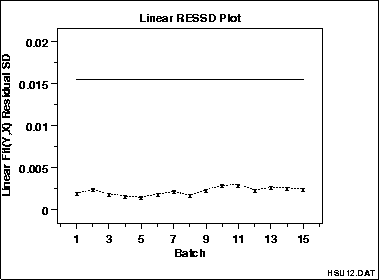1.3. EDA Techniques
1.3.3. Graphical Techniques: Alphabetic
1.3.3.19. |
Linear Residual Standard Deviation Plot |
Detect Changes in Linear Residual Standard Deviation Between Groups
The residual standard deviation is a goodness-of-fit measure. That is, the smaller the residual standard deviation, the closer is the fit to the data.
Linear RESSD plots are typically used in conjunction with linear intercept and linear slope plots. The linear intercept and slope plots convey whether or not the fits are consistent across groups while the linear RESSD plot conveys whether the adequacy of the fit is consistent across groups.
In some cases you might not have groups. Instead, you have different data sets and you want to know if the same fit can be adequately applied to each of the data sets. In this case, simply think of each distinct data set as a group and apply the linear RESSD plot as for groups.

This linear RESSD plot of the HSU12.DAT data set shows that the residual standard deviations from a linear fit are about 0.0025 for all the groups.
Group Residual Standard Deviation Versus Group ID
- Vertical axis: Group residual standard deviations from linear fits
- Horizontal axis: Group identifier
- Is the residual standard deviation from a linear fit constant across groups?
- If the residual standard deviations vary, is there a discernible pattern across the groups?
Checking Group Homogeneity
Linear Slope Plot
Linear Correlation Plot
Linear Fitting

